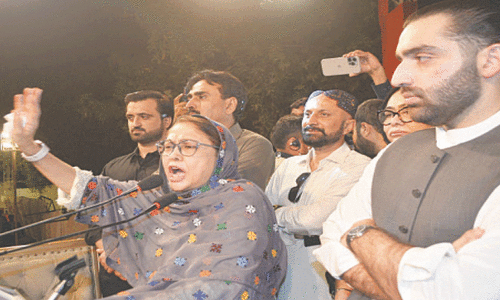 KARACHI, Aug 12: Even as the state basks in its own admiration for promoting women rights, that these claims are much ado about nothing is reflected in one simple reality: Karachi, home to nearly 16 million people, has only one state-run women’s shelter — which provides shelter to a mere 17 females, three of them underage girls.
KARACHI, Aug 12: Even as the state basks in its own admiration for promoting women rights, that these claims are much ado about nothing is reflected in one simple reality: Karachi, home to nearly 16 million people, has only one state-run women’s shelter — which provides shelter to a mere 17 females, three of them underage girls.
Founded in 1961, the Darul Aman was conceived as a sanctuary for women who have lost familial protection or been rendered destitute.
For most of the past two decades, however, the shelter has housed only women sent there by court order. Even as a refuge, moreover, the Darul Aman fails: despite a grant of Rs20 million sanctioned last year by the city government, there are no recreational or vocational training facilities, barely any medical facilities and the women living there claim that “it is no less than a prison.”
Located near Aisha Manzil, the Darul Aman used to be run by the Sindh government’s Social Welfare Department but was handed over to the city government’s Community Development Department last year. The institution made headlines this March, when a woman ran away from the shelter. Although Fatima was recovered by the police soon afterwards, disciplinary action against the staff was taken by minister Rauf Siddiqui months later, in July. [Subsequently, the case in which Fatima was implicated was settled and she is now at liberty.]
Virtual prisoners
The number of women staying at the Darul Aman is surprisingly low. According to Justice Nasir Aslam Zahid, in most cases the custody of the woman is handed over to her family or her spouse.
“Nevertheless,” he told Dawn, “what surprises me is that there are over 70 women housed in each of the Darul Amans in Lahore and Sukker.” The number of such cases is probably similar in Karachi, he mused, “but perhaps fewer women are sent to the Darul Aman here.”
The women at the Darul Aman range in age between nine and 40. The majority married against their families’ will, and in some cases, were physically abused or even given death threats.
They belong to different areas but they are here against their will because cases in which they are involved are being processed in the city’s courts. That they are closely watched and treated as virtual prisoners is indicated by the fact that the centre’s matron Humera Tanvir, who is also the temporary assistant director of the centre, dogged this scribe’s footsteps; fortunately, the women managed to give information by talking in Punjabi and Sindh.
Through such comments, a picture emerged about the negligence and authoritarianism rampant at the Darul Aman.
Lack of facilities
The women are not allowed to leave the centre and no visitors are allowed save parents and guardians. There is a room meant for cooking classes but all it holds is a refrigerator and some small dining tables. There is also a sewing room but the three machines show no signs of ever having been used. Some of the young women say that they are often beaten by the centre’s female clerk. A 15-year-old, who is to be released soon, complained that during a visit, her mother was verbally abused by the matron.
A major cause of distress is the lack of medical care. Two of the women housed in the Darul Aman are pregnant but they have no access to the required medical tests. 20-year-old Hanifa’s brother shot her because he disapproved of her choice of husband. “I still have the bullet in my shoulder but the Darul Aman administration does not care,” she said.
Dr Ismat Rauf, who visits the centre three times a week, complained that “there is not much I can do, given the lack of equipment and facilities. Even the medicines we get are donated by the Edhi centre,” she told Dawn. Meanwhile, all the women complained that they have to purchase medicines out of their own pockets.
Given that the matron insists that “the centre does not get enough funding,” one has to wonder where the Rs20 million set aside for the Darul Aman in the city government’s 2006 budget were spent. The EDO Community Development, Rehana Saif, was unavailable for comment although according to a September 14, 2006, Dawn report, she visited the Darul Aman last year under the city nazim’s directive and found that it lacked basic facilities, including medical assistance.












































